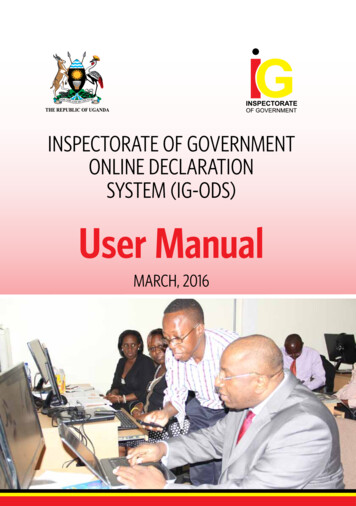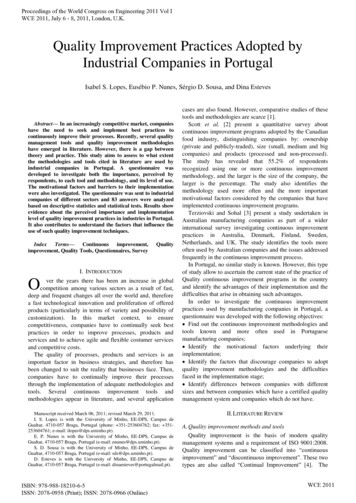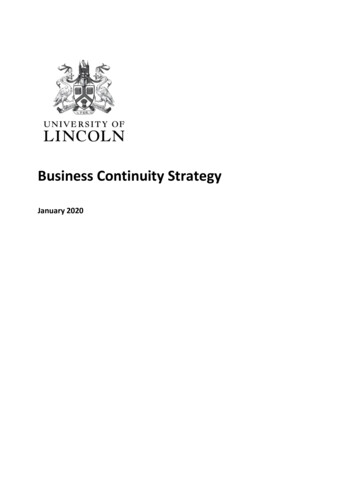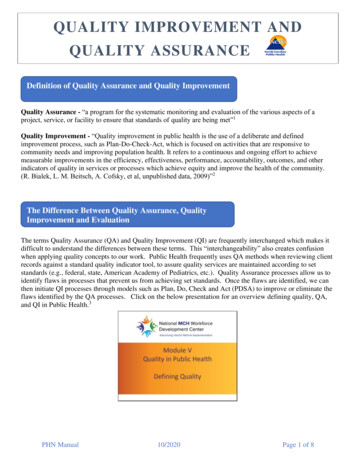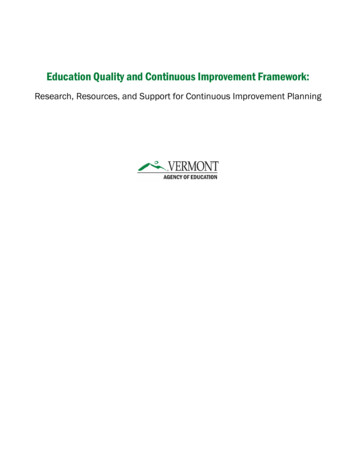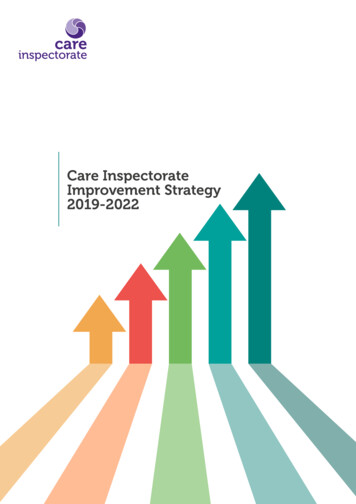
Transcription
Care InspectorateImprovement Strategy2019-2022www.careinspectprate.com 1
ForewordI am delighted to introduce the refreshed Improvement Strategy 2019-2022. This demonstrates how wehave successfully strengthened our improvement support role and function across the Care Inspectorateand celebrates the difference that has been made, ultimately, to the lives of people experiencing care. Itprovides an insight into what our improvement support offer will be over the next three years and howwe will identify where improvements are required. The strategy describes how we will build the skills,confidence and capacity for improvement support with our own staff and across the social care and earlylearning and childcare sectors in Scotland. It supports our new corporate plan and contributes to realisingour vision and our common purpose which is world-class care.In 2017, we produced the very first Care Inspectorate Improvement Strategy with agreement from ourBoard. The Model for Improvement1 on page 12, adopted by the Institute for Healthcare Improvement,has been used successfully as our improvement methodology. This methodology is research-based andhas shown that it can support the process of self-evaluation across health, social care and early years.This model provides a framework for identifying, testing and evaluating if an improvement has takenplace to support implementing long-term changes. A number of providers, partnerships and care serviceshave taken part in our improvement workshops and with support from our inspection staff found thisframework successfully supports improvement in care.In the Care Inspectorate, we are in a unique position in that we provide scrutiny and assurance and wesupport improvement. Scrutiny drives continuous improvement and acts as a diagnostic tool on whichwe can plan our improvement support activity. We have a commitment to collaborative improvementand working in partnership and strengthening relationships with our stakeholders. Our improvementsupport is shaped by what people experiencing care tell us is working and not working well alongside theintelligence that we gather. In this refreshed improvement strategy, there is a particular focus on threespecific areas of growth – growing improvement support, growing innovation and growing involvement.This will be underpinned by the development of more in-depth workshops to build improvement capacityand capability with a view to spreading and sustaining effective practice.“Scrutiny drives continuous improvement and actsas a diagnostic tool on which we can plan ourimprovement support activity.” Growing improvement capacity and capability – this is integral to the core purpose of our work;we have a duty to support improvement in care. This is expressed in the extract from the relevantlegislation which is as follows:1The Institute of Healthcare Improvement uses the Model for Improvement as the framework to guide improvement work.This model, developed by Associates in Process Improvement, is a simple, yet powerful tool for accelerating improvement.2 Improvement Strategy 2019-22
Section 44(1) b of the Public Service Reform (Scotland) Act 2010 places upon us“the general duty of furthering improvement in the quality of social services”. Growing innovation – testing out, supporting and spreading innovative practice and influencingpolicy across social care and the early years will support the development of world-class care andprovide models of care which are fit for the future. Growing involvement – the involvement of people who experience care and support will help todirect improvement support to where it matters most for people and the communities they live in.The refreshed improvement strategy describes how we aim to support social care services, providers andpartnerships to develop more skills to make lasting improvements and involve those who experience careand support throughout the process.Peter MacleodChief Executivewww.careinspectprate.com 3
IntroductionThis improvement strategy is focused on how we can grow our capacity to further embed a culture ofcontinuous improvement across the care sector in Scotland that supports improved outcomes for peoplewho experience care. Primarily this strategy is for us in the Care Inspectorate, to appreciate what hasbeen accomplished so far through the evaluation of our work, and what requires to be done in relation toour improvement support role to support the outcomes of the Corporate Plan 2019-2022 over the nextthree years.This work builds on the Improvement Strategy 2017-2019 with a focus on three key objectives: growingimprovement support, growing innovation and growing involvement. These key objectives support theHealth and Social Care Standards which put people’s rights and what matters to them at the heart ofwhat we do and the new quality frameworks. The quality frameworks put a greater emphasis on selfevaluation for the purposes of identifying what needs to improve, along with quality illustrations showingwhat good care looks like.The Care Inspectorate is a scrutiny body which supports and drives improvement. This means we lookat the quality of care in Scotland to ensure it meets high standards. Where we find that improvementis needed, we support services, providers and partnerships in a variety of ways to take positive steps tomake changes that improve the quality of care.We work across early learning and childcare, integrated health and social care, social work, social servicesand criminal justice social work. We regulate around 13,000 care services and carry out joint inspectionswith other bodies of services for adults and children across local partnerships, as well as thematicinspections and community justice.4 Improvement Strategy 2019-22
Summary of care services registered by service type at 31 March 2019Source: Care inspectorate Service List at 01 April 2019Care serviceAdoption serviceAdult placement serviceCare home serviceChildcare agencyChildmindingDay care of childrenFostering serviceHousing support serviceNurse agencyOffender accommodation serviceSchool care accommodation serviceSecure care accommodation serviceSupport serviceAll types of care serviceSubtypeAlcohol and drug misuseBlood-borne virusChildren and young peopleLearning disabilitiesMental health problemsOlder peoplePhysical and sensory impairmentRespite care and short breaksMainstream residential schoolResidential special schoolSchool hostelCare at homeOther than care at 10152035751,03044112,886www.careinspectprate.com 5
The building blocksImprovement support and the Corporate Plan 2019-2022The delivery of the strategic outcomes and subsequent objectives outlined in our new Corporate Plan2019-2022 will be supported through the activities outlined in this strategy.Corporate Plan 2019-2022: Key strategic outcomes and objectivesStrategic outcomePeople experience high-quality carePeople experience positive outcomesPeople’s rights are respected6 Improvement Strategy 2019-22Strategic objectives Our scrutiny, assurance and improvement supportwork will lead to improved quality of care andwellbeing for people. Poor-quality care will be addressed quickly,through a wide range of scrutiny assurance andimprovement support interventions. Scrutiny, assurance and improvement supportinterventions will be influenced by the views andexpertise of people who experience care andtheir carers. Care providers and commissioners will besupported to self-evaluate and build capacity toimprove. Intelligence and evidence gathered from scrutiny,assurance and improvement support work willinform and assure the public and ourstakeholders, contributing towards addressinghealth and social inequalities. Based on intelligence, we will focus our scrutiny,assurance and improvement support activity towhere it will have the greatest impact. Our registration of services will support thedevelopment of high-quality and innovativeservices. We will develop quality frameworks forinspection that are outcomes-focused andexperience-led, promote self-evaluation and carebased on the Health and Social Care Standards. Our work will inform the development of personled care and support, including the effectivenessof social work practice.
Improvement support is not the responsibility or remit of one team but of the organisation as a wholeand as a result of the work we are doing our workforce are growing in confidence and knowledge inimprovement approaches to support the care sector. This is a great strength of the Care Inspectorateand its approach to improvement support, it is part of everyone’s role, crosses directorates and everyonehas a part to play. This refreshed improvement strategy gives a focus on how we as an organisation willprovide improvement support across the Care Inspectorate. Improvement support is a key component ofour new business model and has a significant role to play across registration, inspection, complaints andenforcement. Over the next three years, the improvement support aspect of our work will strengthen notonly to support improvement in regulated care services but also in strategic inspections.“Improvement support is not the responsibility orremit of one team but of the organisation as awhole and as a result of the work we are doing ourworkforce are growing in confidence and knowledgein improvement approaches to support the caresector. This is a great strength of the CareInspectorate and its approach to improvementsupport, it is part of everyone’s role, crossesdirectorates and everyone has a part to play.”Embedding a culture of self-evaluationSelf-evaluation is central to continuous improvement. One of our key strategic objectives in our CorporatePlan is to promote quality self-evaluation with providers and partnerships and to work collaborativelywith them to develop effective tools to support the self-evaluation process. Through the activities ofthis strategy we will, using an improvement support approach, carry out this work. Self-evaluation is areflective process through which providers of care services can get to know what they do well and identifywhere they need to improve, and the best way to do that. Self-evaluation is a dynamic and continuousprocess rather than a one-off activity. It is forward looking, leading to the development of improvementplans and the relevant actions to test change ideas for improvement to see what works best, which leadsto implementing good practice and supporting innovation in care. Self-evaluation is a very importantmarker of quality assurance. There is a guide to self-evaluation on The Hub website.Improvement support and the Health and Social Care StandardsThe Health and Social Care Standards provide a human rights, person-led focus through which theoutcomes of improvement support can be measured. These standards, which have a strong focus on whatmatters most to people, will continue to enable us to build a culture and understanding of improvementwithin the Care Inspectorate and across the social care sector. The standards also challenge us to exploredifferent opportunities for improvement activity and the testing of innovative models of care. The qualityframeworks set out the elements that will help us answer key questions about the difference care iswww.careinspectprate.com 7
making to people, and the quality and effectiveness of the things that contribute to that. The primarypurpose of a quality framework is to support services to self-evaluate their own performance. The sameframework is then used by inspectors to provide independent assurance about the quality of care andsupport. By setting out what we expect to see in high-quality care and support provision, it can helpsupport improvement too.Involving peopleJust as there has been a shift in our approach to scrutiny and assurance to focus on outcomes for peoplethrough the assessment of quality in services being based upon people’s personal experiences, we needto ensure the same principles are followed for improvement support. We will strengthen the links to theInvolving People team to explore ways of engaging with people who experience care as well as with ourinspection volunteers to help realise the aspirations of the Involvement Strategy.We will actively encourage people to get involved in influencing and shaping our improvement supportprogrammes. Improvement, by the very nature of the process, requires us and all our partners to workdifferently and to be united and optimistic in our approach. In order to see success, the experience,knowledge and input of everyone involved must be valued and respected while working on the principlesof co-production and collaboration such as “we all teach, and all learn”.The HubWe have a section Your Improvement Journey on The Hub website.This takes people through the steps involved in identifyingimprovement areas, thinking about their change ideas and measuringthe impact of the change. The section also hosts our growing suite ofimprovement support resources, guidance and other materials, includingpractice guides. Over the coming year, we plan to develop this site furtherto include more improvement stories from scrutiny and improvement supportto highlight lessons learned, including when improvement does not goaccording to plan and how challenges can be overcome. One of the keyresources we have developed since the first Improvement Strategy waspublished is Eating and drinking well in care, which is available on The Hub.Eating and drinking well in care:good practice guidance for older peopleIntelligence-led improvement supportThe Care Inspectorate firmly believes that effective use of intelligence is the foundation for our newbusiness model (Figure 1) and scrutiny, assurance and improvement support approaches – enabling ourwork to be intelligence-led, risk-based, targeted and proportionate. This helps towards making the bestuse of our limited resources by targeting them to where they can have the greatest impact in protectingpeople, by supporting improvement and innovation towards world-class care. An intelligence-ledapproach is critical to enabling us to intervene early and support sustainability of services that are at riskof failing or closure.8 Improvement Strategy 2019-22
Almost uniquely among health and social care regulators, the Care Inspectorate is responsible forinvestigating complaints about registered care services. Complaints are one of the most important wayswe can support rapid improvement in care quality. Complaints activity can also provide us with importantintelligence in order to know where to target our improvement support.Our current business and digital transformation programmes give us an opportunity to develop ourbusiness model in which improvement support can be clearly identified as a core function of what we doand is aligned with our core purpose. It is anticipated that this will allow our activities and interventionsacross our business model to be recorded appropriately in order to identify what, when and how this isbeing provided and the impact evaluated. This will provide good intelligence and enable us to look at thethemes emerging from our scrutiny and assurance activity. Understanding the intelligence that we gatherwill allow us to provide the right intervention at the right time with the maximum effect and impact.Figure 1: New Business ModelScrutIHealth and elPolicy and surancewww.careinspectprate.com 9
Improvement alliancesCollaboration is key to successful improvement and this has been demonstrated many times throughoutour improvement support work, and particularly through programmes such as Care About PhysicalActivity Programme (CAPA) where the strength of relationships with partners and stakeholders iscritical to success. Over the past two years we have further built and nurtured relationships with otherimprovement bodies and organisations, such as the iHub in Healthcare Improvement Scotland (HIS),in order to maximise our collective improvement support efforts and develop, share and spread goodpractice. Working collaboratively with local communities and local subject matter experts where wecannot directly provide that much needed expertise, is also essential to support sustainablepositive change.We have been involved in a number of successful collaborative projects. We are working with Scottish Care and large independent sector providers to provide improvementworkshops across partnership areas to build capacity and capability in improvement support. We worked with care home providers, dietitians and home caterers to co-produce Eating anddrinking well in care, a resource to support good eating and drinking in care homes for adults. Wealso worked with early learning childcare organisations, health colleagues and Scottish Governmentto develop and produce Food Matters, a resource highlighting good practice examples from careservices based on the Setting the Table guidance for early years. We worked with HIS, iHub and Scottish Care on Reducing Pressure Ulcer in Care Home ImprovementProgramme. Tools were developed and are hosted on the pressure ulcer microsite. We continue toconnect with the tissue viability specialist nurses in community settings who cover care homes toscale up and spread the learning. We are working with colleagues in the Dutch Inspectorate to share learning about using the ShortObservational Framework for Inspection (SOFI 2) to improve outcomes for people. We are collaborating with the Focus on Dementia Team in the iHub to support the SpecialistDementia Unit Improvement Programme, addressing the recommendations from the Mental WelfareCommission report Dignity and Respect. We have been involved in a series of presentations with the Scottish Social Services Council (SSSC),HIS, Children and Young People’s Improvement Collaborative (CYPIC), NHS Education Scotland (NES)and the Improvement Service to Chief Officers and Chief Social Work Officers to inform them aboutthe improvement support function of different improvement support bodies. We partnered an improvement initiative in NHS Tayside to co-produce with the health board, ScottishCare and community pharmacy a system which has significantly reduced medication waste in carehomes. The Care Inspectorate and SSSC are working with a wider range of stakeholders including the Centrefor Excellence for Children’s Care and Protection (CELCIS), the Alliance and Social Work Scotland toco-produce a compassionate care resource, which will illustrate good practice.10 Improvement Strategy 2019-22
We are collaborating with the Improvement Service and Scottish Care to test an improvement planningtool in small care home providers to focus their improvement efforts. The improvement support team is currently supporting workshops with SSSC to promote improvementlearning and development and the role of leadership to maximise improvement efforts across the sector. Working with providers of services for young people, inspection volunteers and inspection teams weare developing a good practice guide to support the key elements of good personal planning for youngpeople in residential care.What do we mean by improvement?There are several different ways to support improvement and different approaches and methodologies suchas EFQM and LEAN. The Care Inspectorate has identified the Model for Improvement as the approach tosupport services, providers and partnerships to make sustainable change. This approach is well researchedand has been used across health and social care effectively to make improvements that last.Quality improvement has been defined by some experts as:“the combined, unceasing efforts of everyone – professionals, those experiencing services and their families,researchers, planners, educators and others – to make the changes that will lead to better outcomes (healthand social), better system performance (care) and better professional development (learning)”What is Quality Improvement?The ‘science of improvement’ is a different approach to assuring quality. It goes beyond traditional methodsof setting targets, identifying areas for improvements and requirements in order to see improvement in carequality, where it may be appropriate to do so. It brings a systematic approach to realising improvement inthe quality of care which focuses on outcomes for people. While importantly the responsibility for makingimprovements rests with those providing and leading services, a true improvement approach brings peopletogether to identify, plan and make the changes collaboratively, where it has been clearly identified that itwill make a difference to the lives of individuals. It provides opportunities and generates creativity andinnovation.The Institute for Healthcare Improvement (IHI) talks about this ‘science of improvement’ which indicates thatin order to make improvements something fundamentally must change. However, not all changes result inimprovements. Therefore, it is necessary to explore where improvement is required and what change mayresult in improvement, so applying the principles of improvement science and achieving positive, sustainablechange. This exploration of what improvement is required may come directly from self-evaluation, scrutinyand assurance evidence or may take the form of a root cause analysis of systems and processes. Thechanges may be informed by existing good practice but may also come from testing innovative approaches.Key principles of improvement science are: understand and recognise where and why improvement is required – self-evaluation prioritise and plan improvements develop or identify a change idea to test, which may result in an improvement have a system in place that will evidence improvement has taken place.www.careinspectprate.com 11
Using the Model for Improvement (Figure 2) when planning to carry out improvement work provides aframework in which improvement support can happen. This consists of three fundamental improvementquestions in order to define the improvement aim, intended outcome and change idea and a systemfor planning and running small tests of change – Plan, Do, Study, Act (PDSA). This approach has provento promote efficient and effective, sustainable change and, importantly, provide learning that supportsindividuals and organisations to build further improvement interventions.Figure 2: Model for ImprovementWhat are we trying to accomplish?How do we know that a change isan improvement?What changes can we make thatwill result in improvement?APSD Institute for Healthcare Improvement, BostonWhat do we mean by improvement support?Improvement support is integral to the Care Inspectorate’s core purpose and a key function.Our inspection staff are our biggest resource for supporting improvement through the collaborativeregulatory relationships they have with providers and services as well as their use of improvementmethodology and ability to share stories of success. Direct improvement support, advice or guidanceis most often provided by inspectors and team managers as part of the registration, inspection andcomplaints process.Specific improvement support comes from our Improvement Support Team (IST), who are all qualifiedimprovement advisers. Their expertise can support inspection staff through learning and development,advice and mentoring to build confidence and develop their knowledge of improvement science andimprovement tools. They also provide improvement support to care providers and local partnerships incollaboration with local networks and other organisations, often as a result of improvement identifiedthrough our intelligence.12 Improvement Strategy 2019-22
Some specific improvement support projects over the next year include: reducing medicine incidents in care homes testing and spreading the use of video conferencing in care homes reducing falls in care homes using the Managing Falls and Fractures in Care Homes for OlderPeople resource pack developing and testing what a ‘good personal plan’ looks like across the lifespan for a child or youngperson developing and testing good practice guidance for housing support staff developing an improvement support resource on compassionate care.Inspectors and improvement advisers also collaborate and work on joint improvement initiatives. Forexample, good practice guidance is currently being developed to identify the key principles of a personalplan. This improvement activity was identified through intelligence from scrutiny, its aim is to support thesector to embrace, understand and implement person-centred care for people who experience care. Itwill support the rights of people to be heard.National improvement programmesNational improvement programmes are led by our improvement advisers and, where possible andcapacity allows, with the involvement of our inspectors to further support improvement directly withservices. An example of a national programme is the Care About Physical Activity Programme (CAPA),which is funded by the Active Scotland division of the Scottish Government until April 2020.The external evaluation of the first phase of CAPA showed much success and identified that promotingmore movement every day is having a positive impact on people’s health and wellbeing.This has demonstrated: significantly reduced likelihood of falls significantly improved physiological measurements increased level of independence more time spent moving each day.The next phase of CAPA has expanded, moving to a more regional approach including many morepartnership areas than the previous programme. This phase continues to be focused on older peopleand works closely with care professionals from care at home, day care, sheltered housing and care homeservices. To date we have engaged with over 600 staff in nine partnerships in this second phase of CAPAwhich will be completed in May 2020.Improvement support and strategic inspectionCurrently the IST is working with our inspectors in strategic inspection to explore how best to coordinateour improvement support with other bodies and how best to support improvement for specific topicsfrom thematic inspections.www.careinspectprate.com 13
Following a thematic inspection undertaken by the Care Inspectorate or a joint inspection with otherscrutiny partners, it may be that our findings suggest that the necessary improvement support isbest provided by a body other than ourselves in which case we might engage with one or more of ourpartners to provide it.In some circumstances services, providers and partnerships may benefit most from support from theIST where learning and development around the Model for Improvement and structured approachesto specific improvement priorities would be have most impact. Where possible this would be donealong with colleagues in strategic inspection, particularly link inspectors. A current example of this iswith Dundee City Partnership. Following a thematic inspection on public protection, one of our seniorimprovement advisers from the IST, working with the link inspector for that area and collaborating withDundee City Partnership, has supported a focused programme of improvement support to build capacityand capability for improvement and transformation in that area using the Model for Improvement and animprovement science approach.In some circumstances services, providers and partnerships may benefit most from support frompeople who have the necessary specialist skills, knowledge and experience relative to the area whereimprovement is needed. There are also times where a joint approach with improvement science andsubject matter expertise is best.Following a strategic inspection where systemic failings within or across services are identified this mayrequire external specialist improvement support from outwith the area. In these circumstances, the CareInspectorate has a crucial role to play in identifying the nature and extent of the support required basedon the scrutiny evidence.Improvement support for integrationThe Care Inspectorate has a duty of collaboration with other scrutiny and improvement bodies, includingHIS, Her Majesty’s Inspectorate of Constabulary in Scotland (HMICS), Her Majesty’s Chief Inspector ofPrisons for Scotland (HMIPS), Education Scotland, Mental Welfare Commission (MWC) for Scotland, theAccounts Commission for Scotland and the Scottish Housing Regulator.Over the past years, we have strengthened our improvement support role and our improvement alliances.Much of the work we have done has supported partnership working and integration with the sole aim ofimproving people’s life experiences.The recent recommendations of the Ministerial Strategic Group for Health and Community Care providea further opportunity to review how our work has contributed to integration and to consider howimprovement bodies can work more collaboratively to further support the process of and outcomes fromintegration. This will include looking at models of delivery and how we can work with the improvementbodies identified to be more streamlined and targeted in our approach to improvement support.14 Improvement Strategy 2019-22
1. Outcomes from the Improvement Strategy 2017-2019 and next stepswhich will be delivered through the refreshed strategy 2019-2022Key areas1. Building animprovementinfrastructureOutcomesQuality improvement (QI) learningand development workshopsprovided to 1,259 members ofthe social care workforce acrossScotland.2. Supporting colleagues 25 QI one-day workshops werein scrutiny and assurance delivered to inspectors for regulatedcare and strategic inspectors.to be agents forimprovementNext stepsThe IST will continue to support thesocial care workforce with QI learningas well as supporting the learningthrough the implementation phase.3. Building improvementcapa
Growing improvement capacity and capability - this is integral to the core purpose of our work; we have a duty to support improvement in care. This is expressed in the extract from the relevant legislation which is as follows: 1 The Institute of Healthcare Improvement uses the Model for Improvement as the framework to guide improvement work.
